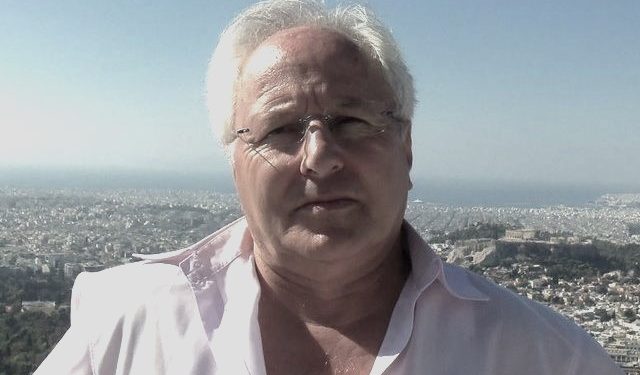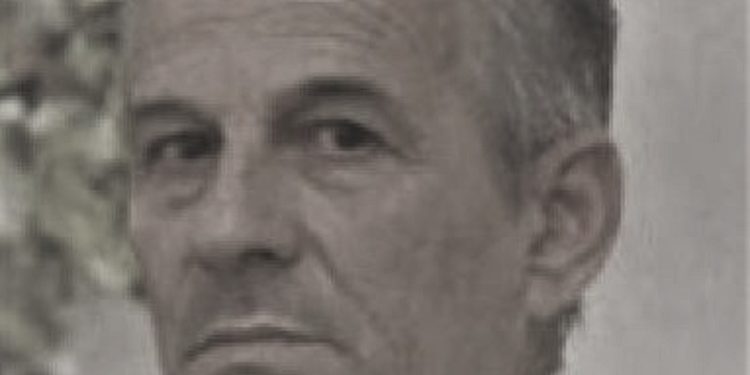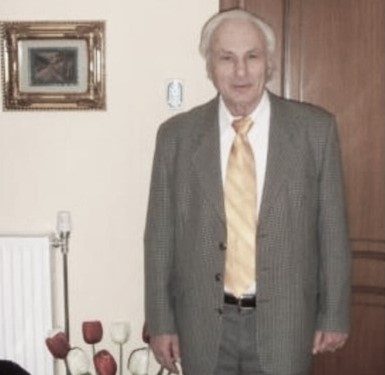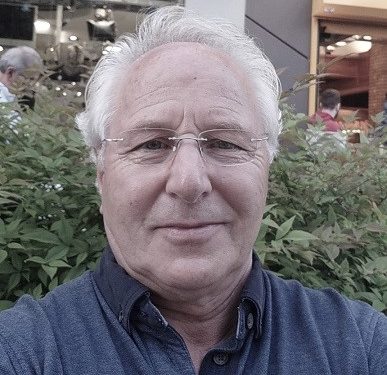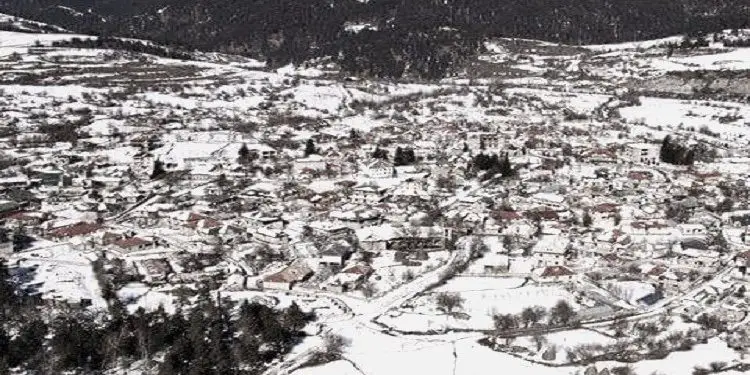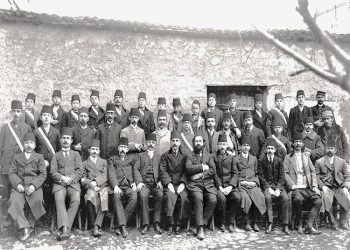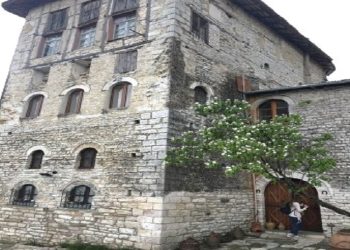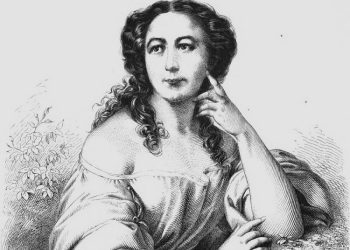Memorie.al / The origin of the Ballauri clan is Voskopoja. They moved from it when this medieval city was burned several times in a row. Every time Voskopoja burned, the Ballauris’ house also burned, just like the other houses of the Voskopojars, shops, and churches. But after every burning, the Ballauris would rebuild another house, just as the first one, left by their great-grandparents, had been. Their last house is remembered as one of the most beautiful buildings in Voskopoja. The Ballauris were wealthy, but also in love with Voskopoja. They were equally in love with books.
When Voskopoja was experiencing one of its biggest fires and when more ash and ruins remained on its soil than standing dwellings, the Voskopojars moved to almost all the cities of the country, such as Berat, Durrës, Elbasan, Shkodër, Skopje, but a part of them settled in Korça. Many others emigrated to neighboring countries and the farthest parts of the world, so much so that it seems you will meet Voskopojars everywhere you go.
The Ballauri clan had the same fate, with a part of them settling in the city of Korça, while others in foreign countries. Those who went far were lucky. Their name is either written in encyclopedias, or many streets and squares of European cities bear their names, while those who remained here suffered a black fate that followed them step by step for 50 years in a row, just like the red louse disease clings to you and does not leave you until death.
Aleko Ballauri tells such a story, which has remained in his memory since childhood but will remain indelible throughout his life. Even to this day, the Ballauris are unable to explain why the regime of Enver Hoxha was so afraid of them! Perhaps because they were people of books. But to understand the truth of this great and educated clan, the life of the Ballauris, as they experienced it during the communist regime, comes to our aid.
The Father
“My father, Vasil Ballauri, unexpectedly took to bed one day, to languish for 10 years in a row, until he would depart from life forever in 1962. I was small then,” recounts Aleko Ballauri, “and I didn’t know what my father was suffering from, but what I feared most of all was the red louse disease. I was very afraid of the ‘red louse,’” Aleko Ballauri continues to recount. “I heard the expression ‘red louse’ very early in my childhood. In our family, they said that the ‘red louse’ is a dangerous disease, and they even added that two Ballauris had died because of this disease.”
“The mother used to say, ‘The red louse devoured Ilia and Gaqo Ballauri.’ Because this word was mentioned very often in our family, I had formed my own idea of this disease. It seemed to me as if the red louse was a strange, ugly creature that, more than a body had large teeth and never-ending venom. This creature approached people slowly and poured venom into people’s souls, so that they would have a horrific death, unbearable from pain.
My father’s illness was getting heavier and heavier. He had a cerebral hemorrhage, (certainly he did not suffer from the ‘red louse’), then he suffered successive paralysis in his leg, hand, mouth, and face. My father was becoming completely disfigured. As I watched him in this state, my mind always went to the ‘red louse.’ I prayed to God that he was only not sick from the red louse, because I knew that this was a terrible disease!”
Two Ballauris die from the “red louse”!
“The ‘red louse’ was turning into an obsession for me. I wanted to know how the two Ballauris had died, about whom they had told me in the family. One day I asked to learn who among the Ballauris had died from this type of disease and what their sufferings had been like. I learned that in 1945, Gaqo and Ilia Ballauri, both close to my father, had died from the ‘red louse’ disease. It had been a very painful story. Both Ballauris had died scorned, disappointed, despairing, and abandoned by everyone.
When I learned that both Ballauris, both Ilia and Gaqoja, had been doctors, I was even more horrified. Even though they were doctors, they could not withstand the ‘red louse.’ Along with the two Ballauris, others had also died. All of them had been devoured by the ‘red louse.’ While asking about their death, I learned that the two Ballauris had been radiologists with rare skills. Ilia had studied in Athens, while Gaqoja in Davos, Switzerland. Neither of them had been able to stay away from Korça and their country.
Like my father, they had returned to Albania, but they had never thought that a dark fate, similar to that of the ‘red louse,’ awaited them there in the city of Korça. Today, in the History of Albanian Medicine, they are mentioned as the founders of radiology in our country. As I said at the beginning, their death had been extremely painful. Everything had happened in 1945, when a partisan battalion had remained isolated in the Gorë-Opar highlands. It was winter and it was cold. The snow had gone over two meters.
The ‘red louse’ had broken out in the ranks of the battalion. People were dying one after the other. None of them would have remained alive. It was impossible for this situation to be faced without the help of other doctors. The news had spread throughout Korça: ‘the red louse was eating people daily.’ To get out of the situation, Mehmet Shehu called on the doctors of Korça to provide their help. In truth, no one moved from the spot. The ‘red louse’ was a dangerous disease; it led straight to the grave (Shën Triadë). No one wanted to sacrifice their life.
The only ones who were willing were Ilia and Gaqo Ballauri. Being doctors, it was difficult for them to avoid this call. They tried to cure every person sick with the ‘red louse,’ but during the efforts, both Ballauris became infected with this terrible disease. They managed to save many people’s lives, but finally, they died themselves from the ‘red louse.’ Not only the Ballauri clan, but also many citizens of Korça, expected them to be declared heroes, but nothing of the sort happened.
The regime remained silent, as if nothing had happened. Unfortunately, the families of the two doctors not only received no support but were also persecuted for 50 years in a row, as bourgeois families. To think of heroes, this had been impossible. For a long time, while their death was mentioned, the ‘red louse’ haunted me, pouring venom into people’s souls.”
The Bourgeois of Korça
“Father continued to languish in his bed. He had begun to feel abandoned by everyone. He had a despairing look that never left his eyes for a moment. Perpetual despair had also gripped the tone of his voice. In truth, the two doctors, Ilia and Gaqoja, were also abandoned in this way, for which it was often said that they, too, had had a bad past. The doctors who died from the ‘red louse’ were ‘guilty’ of having studied abroad and having always had wealth and good houses in Voskopoja, as well as in Korça.
Apparently, the same ‘guilt’ weighed on our father as well. During the First World War, he had served as a translator for the French general, De Quien. Later, he had been a consul in Madagascar, Suez, and Vietnam. At the same time, our family had wealth and modern homes. For this reason, when the Hoxha regime came to power, they first took our house, leaving us in the middle of the street. For 10 years in a row, like many others, labeled as ‘the bourgeois of Korça,’ we lived in basements and shacks.
While my father languished for 10 years, he had to face everything that was happening to Korça and his people. He saw with his own eyes how everything that had been painstakingly created was being destroyed. He saw the imprisonments, internment, tortures, espionage, killing for a piece of bread, raids and looting, burnings and insults, offenses, expropriations, and abductions. All of this, like a black hurricane with a red mouth, snatched everything it found in front of it.
The boots and epaulets with stars rattled through the streets, tearing down doors at midnight and dawn. Men were ripped from their beds and crammed into dungeons and swamps, tortured to steal their knowledge, culture, wealth, and life. All of this saddened my father even more. His despair was so evident that it seemed as if he had something to tell us, but he could not manage to say it, because we were young, and perhaps we would have a hard time understanding it.”
Koço Ballauri, Founder of Microsurgery in America
“My father’s and our despair turned into a great sorrow when father became paralyzed and could no longer speak. He had something to tell us, and we, who had hoped that one day he would tell us, had now lost this opportunity. Perhaps for this reason, father took on an even more desperate appearance. But when the disease had not yet struck him down, he told us that during the period of emigration, another Ballauri from our clan had ended up in America. They called him Koço Ballauri.
He had studied medicine. In America, he had become quite famous, especially in the field of microsurgery. As I listened to my father’s story, I don’t know why I believed that this man of our clan might be capable of wiping the ‘red louse’ disease off the face of the earth. At the same time, I believed that only he could cure our father. The two doctors we had from our clan had died from the ‘red louse,’ while Koço Ballauri had ended up in America. This was our misfortune that no doctor was left in our clan. No one came to visit my father.
‘Can Koço Ballauri ever come to Korça?’ I asked my father. If Koço Ballauri came to Korça, I was sure that he would cure our father and would not let him die. But my father answered my question: ‘He is very far away, son, it will probably take him a long time to come here.’ When I heard these words, I don’t know why I felt sorry. My father’s condition was getting worse and worse, while no one stood by him, except the family.”
“Later when I grew up,” Aleko Ballauri recounts, “I heard that Koço Ballauri continues to be one of the founders of microsurgery in the USA. He was the first in the USA to perform a finger transplant. In 1991, ‘Voice of America’ broadcast several shows about this very great achievement in medicine. However, if he had stayed in Korça, perhaps he would have had the same fate as the other Ballauris?!”
Giancarlo Ballauri, Famous Physicist in Italy
“Fortunately, my father had told us a lot, even though he told it with a voice that conveyed continuous pain and despair. He had told us that one of the people of our clan, Giancarlo Ballauri (Xhankarlo Balluri), had become quite famous in Italy. He was the son of Irakli Ballauri, whose grandfather, like many other Ballauris, had come to Korça from Voskopoja. They later immigrated to Italy. There, Giancarlo Ballauri became one of the most famous physicists in the field of electronics.
He discovered an equation for electron tubes, known as the ‘Ballauri’ (‘Vallauri’) equation. Since 1929, he was an academic at the Italian Academy of Sciences. At the time when the great physicist Marconi was President of the Academy, Professor Ballauri was the Vice President of the Academy. Today in Italy, there are several streets and squares that bear the name of Giancarlo Ballauri. Nevertheless, I prayed every day that the Ballauris remaining abroad would not return to Albania, because I did not want my father’s people to have a desperate death, because of the ‘red louse.’
Since I heard about the death of the two doctors, the ‘red louse’ disease has not left my memory. My father could have very well stayed in foreign countries where he had worked, just as he could have stayed in Hungary, Italy, Austria, Slovenia, Greece, Romania, and even America. He was a man of broad culture. He had finished the Greek gymnasium ‘Zosimea,’ the French institute, ‘Misione Laqiue,’ mastering a number of languages, such as; Italian, French, old and new Turkish, old and new Greek, as well as Latin, but at the same time, he was also able to communicate in Bulgarian and Romanian.
My father deeply knew music, its theory, great composers, played the piano, violin, mandolin, guitar, cello, double bass, etc. He composed quite beautifully. He had been one of the initiators for the founding of the patriotic choir ‘Lira.’ He loved Korça and had returned to Korça, just as the two doctors, Ilia and Gaqo Ballauri, had done, one of whom had left Athens, while the other had abandoned Switzerland, to come to Korça. But despite this, our father’s past was considered black, pitch black. We, his descendants, were just as black. No one could save our biography.”
Ilia Ballauri, Minister of Education in Romania
“In our house,” Aleko Ballauri continues to recount, “no one came. The room where we lived was abandoned by all furniture, because everything we had was taken from us. Only books were left to us. I did not understand why they had not managed to steal the books too?! Maybe they didn’t need them. Maybe father had kept them very carefully. I cannot say how it happened, but the truth was that they had not touched the books. However, I felt satisfied that we had something left as an inheritance from our father.
The only friends we had in our house were Plato, Thucydides, and Demosthenes, who spoke in old Greek, while Cicero and Caesar, who spoke in Latin, and Wagner and Tchaikovsky, we had in German texts. Father told us that the Ballauris had been in love with books and education. After this, he told us about other Ilia from our clan. Ilia Ballauri,” father recounted, “was born in 1867 and passed away in 1936. He lived 69 years but left behind a good work. He, along with his family, like many other Voskopojars, immigrated to different countries of the world, but Ilia Ballauri and his family stopped in Romania.
After the First World War, Ilia Ballauri became the Minister of Education. He is regarded as one of the most successful in Romania. Today in Bucharest, one of the main streets bears his name, father recounted. Nevertheless, even in the face of this reality, we remained with a black past. Perhaps father’s despair became even greater because he knew that his descendants would not have an easy life either. However, even though the disease did not allow him to speak, he managed to tell us that we would manage to see another future…”
Gjergji Ballauri, Professor of the Academy in Voskopoja
“Even though many years have passed since my father’s death, I think he passed away very disappointed. He sought to dispel this state by mentioning the names of Ballauris who had made a name for themselves wherever they went, but also by telling us about our origin. ‘The Ballauris,’ he recounted, ‘originated from the medieval and very cultured city of Voskopoja. Their traces in this city are among the earliest. The first dwelling of the Ballauris was located in the center of Voskopoja, near the old church of Saint Constantine, close to the house of the very famous Kukuzeli family, but this house burned in 1769, in the first disastrous burning of Voskopoja.
For this reason,” father confessed, “the Ballauris built another dwelling. The documents of the time show that the Ballauris’ house was in the Central European style, wide and full of air and light, with many rooms, with a garden full of trees, apples, quinces, and other trees. But this house also burned. The Ballauris built a third house, just as large and beautiful, without thinking that the fire would burn it again, as Voskopja would suffer successive burnings.
For this reason, from the middle of the 17th century, the emigration of the members of this family began to the city of Korça and the world. The Ballauris moved to Hungary, Italy, Austria, Slovenia, Greece, Romania, and America. Precisely at this time, the Voskopojars were forced to abandon the Academy, which had turned into ruins. Father recounted this story with pain, and after pausing for a moment, he told us about one of the renowned people of our clan, Gjergji Ballauri.
According to the lexicographer Danil, Gjergji Ballauri had been one of the most prominent personalities of the time, a man of very broad culture, and one of the most famous professors of the Academy in Voskopoja. He tried to tell such stories until the moment he was paralyzed. After that, he fell into complete silence. The sorrow of not speaking began to gnaw at him even more, until one day in 1962, he closed his eyes forever.”
The Father’s Death
“Father died. He must have died very disappointed. We were small and could not understand what he wanted to tell us, but before he died, he showed us three gold fountain pens. Only he knows how he managed to save those three gold fountain pens from being stolen. ‘When I am no longer here,’ father said, ‘each of you (we were three brothers) will take a fountain pen.’
‘Perhaps what he could not say, perhaps what we had not managed to understand, we would have to put down on paper,’ thus concludes his story Aleko Ballauri, who is now the publisher of many books of poetry, the majority of which include translated poems by great world poets, such as; Edgar Allan Poe, H. Longfellow, the great Russian lyricists, such as; Pushkin, Lermontov, Tyutchev, Esenin, Bunin, etc.
His brother, Ila Ballauri, has not lagged behind in creativity either; he has published several books on genetics, where he is a recognized specialist, but at the same time, he is also known as a good historian of Voskopoja, this former medieval city where his father, Vasil Ballauri, was born, but who would die desperate, because of a regime that resembled the disease of the ‘red louse’!” Memorie.al




